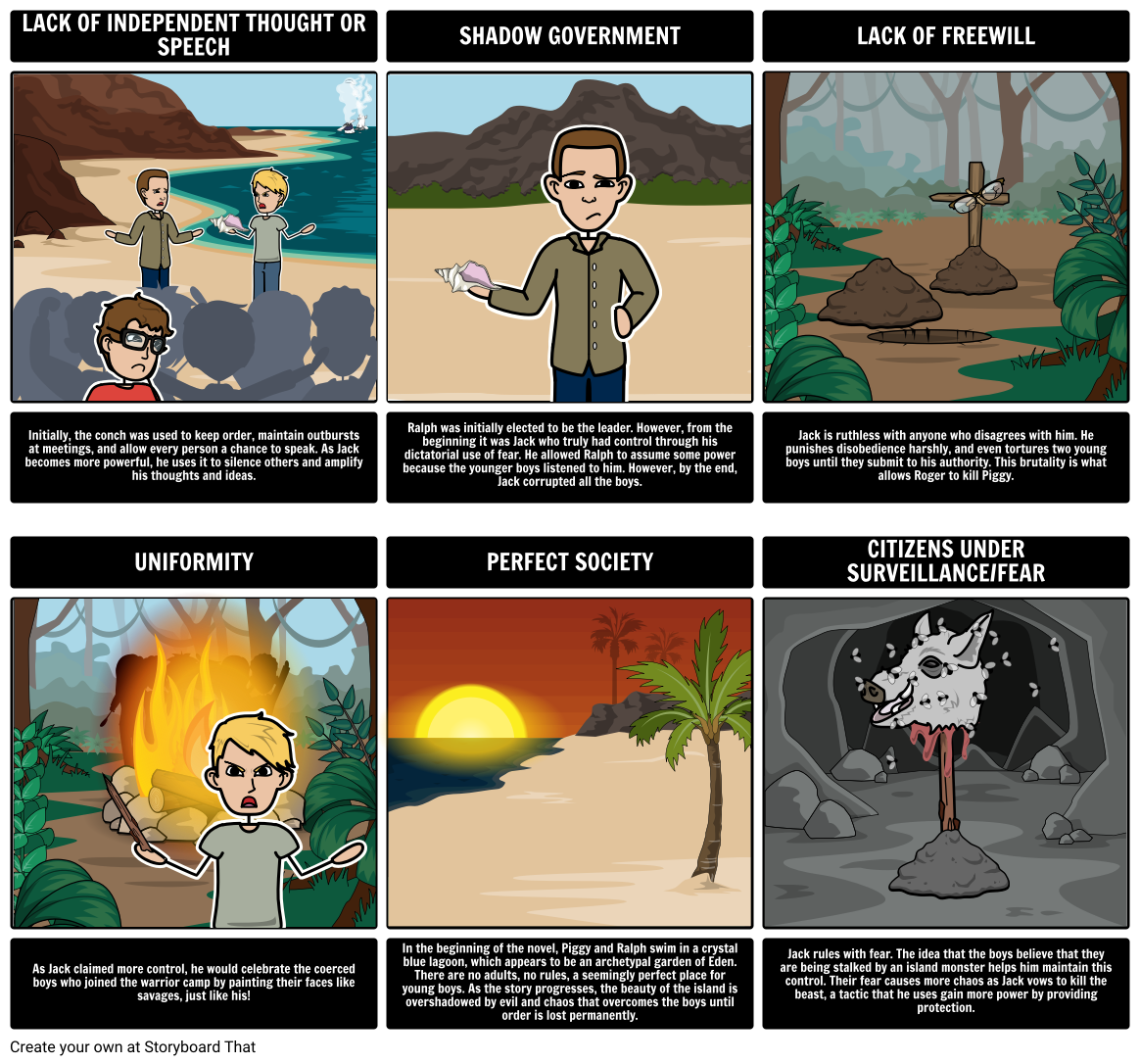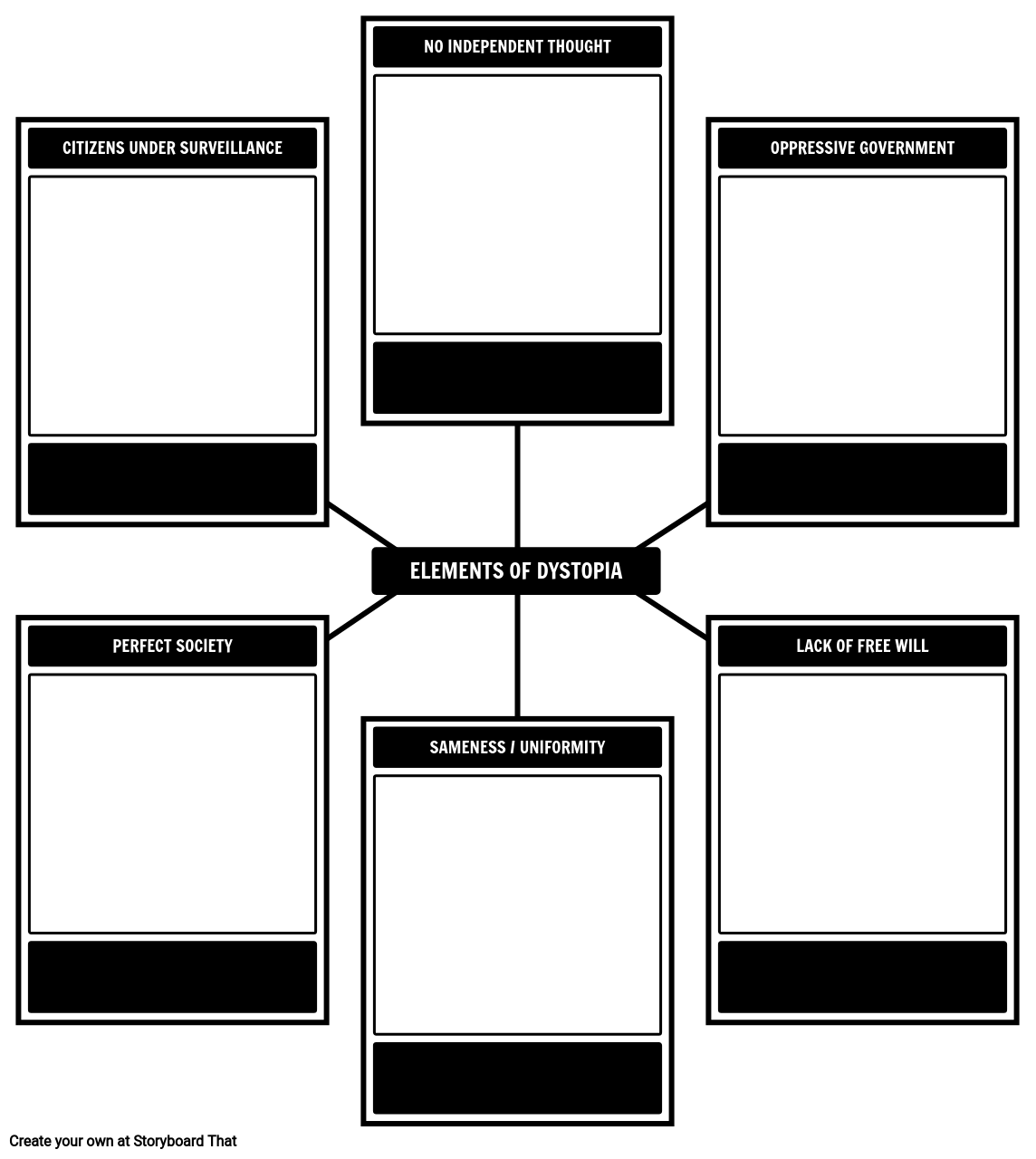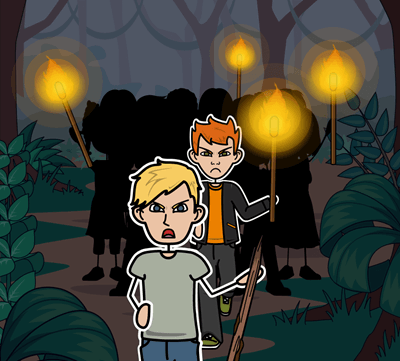Lesson Plan Overview
Utopian/ Dystopian literature is a rapidly growing sub-genre of popular fiction. Authors often use utopias to convey a message about the world we live in today.
Dystopias are extremely flawed societies. In this genre, unlike other literature genres, the setting is often a fallen society, usually occurring after a large scale war, or other horrific event, that caused chaos in the former world. In many stories this chaos gives rise to a totalitarian government that assumes absolute control. The flaws in this sort of a dystopia are center around oppression and restrictions on freedom by central authorities. Lord of the Flies has some of these characteristics, but the frightening aspects are as much in breakdown of society, as the overwhelming power of a central authority.
For more information and elements of this genre see our article: “Teaching Dystopia”.
Lord of the Flies as a Dystopia Example
No Independent Thought or Speech
Initially, the conch was used to keep order, maintain outbursts at meetings, and allow every person a chance to speak. As Jack becomes more powerful, he uses it to silence others and amplify his thoughts and ideas.
Shadow Government
In the story, Ralph was initially elected to be the leader. However, from the beginning it was Jack who truly had control through his dictatorial use of fear. He allowed Ralph to assume some power because the younger boys listened to him. However, by the end, Jack corrupted all the boys.
Lack of Free Will
Jack is ruthless with anyone who disagrees with him. He punishes disobedience harshly, and even tortures two young boys until they submit to his authority. This brutality is what allows Roger to kill Piggy.
Conformity
As Jack claimed more control, he would celebrate the coerced boys who joined the warrior camp by painting their faces like savages, just like his!
Perfect Society
In the beginning of the novel, Piggy and Ralph swim in a crystal blue lagoon, which appears to be an archetypal garden of Eden. There are no adults, no rules, a seemingly perfect place for young boys. As the story progresses, the beauty of the island is overshadowed by evil and chaos that overcomes the boys and order is lost permanently.
Citizens Ruled with Fear and Lies
Jack rules with fear. The idea that the boys believe that they are being stalked by an island monster helps him maintain this control. Their fear causes more chaos as Jack vows to kill the beast, a tactic that he uses gain more power by providing protection.
Template and Class Instructions
(These instructions are completely customizable. After clicking "Copy Activity", update the instructions on the Edit Tab of the assignment.)
Student Instructions
Create a storyboard that shows the six elements of a dystopia in Lord of the Flies.
- Click "Start Assignment".
- Identify events or characteristics of the story that fit into the elements of a dystopia
- Illustrate the examples for each event or characteristic.
- Write a short description below each cell that specifically relates Lord of the Flies as a dystopia.
Lesson Plan Reference
Student Rubric
(You can also create your own on Quick Rubric.)
| Proficient 33 Points | Emerging 25 Points | Beginning 17 Points | |
|---|---|---|---|
| Dystopian Elements | The six common dystopian literature elements are correctly identified and portrayed from the story. The quotes and/or explanations give context to the scene, and are accurate and appropriate to the element being depicted. | 4-5 dystopian literature elements are correctly identified and portrayed from the story, or some of the elements may not be identified correctly. The quotes and/or explanations give context to the scene, but may be minimal, and are mostly accurate for the element being depicted. | 1-3 dystopian literature elements are correctly identified and portrayed from the story, or most of the elements are inaccurately depicted. The quotes and/or explanations are too minimal, or missing altogether. |
| Artistic Depictions | The art chosen to depict the scenes are accurate to the work of literature. Time and care is taken to ensure that the scenes are neat, eye-catching, and creative. | The art chosen to depict the scenes should be accurate, but there may be some liberties taken that distract from the assignment. Scene constructions are neat, and meet basic expectations. | The art chosen to depict the scenes is inappropriate. Scene constructions are messy and may create some confusion, or may be too limited. |
| English Conventions | Ideas are organized. There are few or no grammatical, mechanical, or spelling errors. | Ideas are mostly organized. There are some grammatical, mechanical, or spelling errors. | Ideas may be disorganized or misplaced. Lack of control over grammar, mechanics, and spelling reflect a lack of proofreading. |
Lesson Plan Overview
Utopian/ Dystopian literature is a rapidly growing sub-genre of popular fiction. Authors often use utopias to convey a message about the world we live in today.
Dystopias are extremely flawed societies. In this genre, unlike other literature genres, the setting is often a fallen society, usually occurring after a large scale war, or other horrific event, that caused chaos in the former world. In many stories this chaos gives rise to a totalitarian government that assumes absolute control. The flaws in this sort of a dystopia are center around oppression and restrictions on freedom by central authorities. Lord of the Flies has some of these characteristics, but the frightening aspects are as much in breakdown of society, as the overwhelming power of a central authority.
For more information and elements of this genre see our article: “Teaching Dystopia”.
Lord of the Flies as a Dystopia Example
No Independent Thought or Speech
Initially, the conch was used to keep order, maintain outbursts at meetings, and allow every person a chance to speak. As Jack becomes more powerful, he uses it to silence others and amplify his thoughts and ideas.
Shadow Government
In the story, Ralph was initially elected to be the leader. However, from the beginning it was Jack who truly had control through his dictatorial use of fear. He allowed Ralph to assume some power because the younger boys listened to him. However, by the end, Jack corrupted all the boys.
Lack of Free Will
Jack is ruthless with anyone who disagrees with him. He punishes disobedience harshly, and even tortures two young boys until they submit to his authority. This brutality is what allows Roger to kill Piggy.
Conformity
As Jack claimed more control, he would celebrate the coerced boys who joined the warrior camp by painting their faces like savages, just like his!
Perfect Society
In the beginning of the novel, Piggy and Ralph swim in a crystal blue lagoon, which appears to be an archetypal garden of Eden. There are no adults, no rules, a seemingly perfect place for young boys. As the story progresses, the beauty of the island is overshadowed by evil and chaos that overcomes the boys and order is lost permanently.
Citizens Ruled with Fear and Lies
Jack rules with fear. The idea that the boys believe that they are being stalked by an island monster helps him maintain this control. Their fear causes more chaos as Jack vows to kill the beast, a tactic that he uses gain more power by providing protection.
Template and Class Instructions
(These instructions are completely customizable. After clicking "Copy Activity", update the instructions on the Edit Tab of the assignment.)
Student Instructions
Create a storyboard that shows the six elements of a dystopia in Lord of the Flies.
- Click "Start Assignment".
- Identify events or characteristics of the story that fit into the elements of a dystopia
- Illustrate the examples for each event or characteristic.
- Write a short description below each cell that specifically relates Lord of the Flies as a dystopia.
Lesson Plan Reference
Student Rubric
(You can also create your own on Quick Rubric.)
| Proficient 33 Points | Emerging 25 Points | Beginning 17 Points | |
|---|---|---|---|
| Dystopian Elements | The six common dystopian literature elements are correctly identified and portrayed from the story. The quotes and/or explanations give context to the scene, and are accurate and appropriate to the element being depicted. | 4-5 dystopian literature elements are correctly identified and portrayed from the story, or some of the elements may not be identified correctly. The quotes and/or explanations give context to the scene, but may be minimal, and are mostly accurate for the element being depicted. | 1-3 dystopian literature elements are correctly identified and portrayed from the story, or most of the elements are inaccurately depicted. The quotes and/or explanations are too minimal, or missing altogether. |
| Artistic Depictions | The art chosen to depict the scenes are accurate to the work of literature. Time and care is taken to ensure that the scenes are neat, eye-catching, and creative. | The art chosen to depict the scenes should be accurate, but there may be some liberties taken that distract from the assignment. Scene constructions are neat, and meet basic expectations. | The art chosen to depict the scenes is inappropriate. Scene constructions are messy and may create some confusion, or may be too limited. |
| English Conventions | Ideas are organized. There are few or no grammatical, mechanical, or spelling errors. | Ideas are mostly organized. There are some grammatical, mechanical, or spelling errors. | Ideas may be disorganized or misplaced. Lack of control over grammar, mechanics, and spelling reflect a lack of proofreading. |
How To Facilitate a Discussion on Elements of Dystopia in Class
Discuss Dystopia
Begin by explaining the concept of dystopia to students. Assess their prior knowledge and build the lecture based on that information. Engage the students using interesting vocabulary and grab their interest by mentioning some popular dystopian books and movies.
Engage By Examples
Teachers can arrange a movie session where students can pick one dystopian movie that they will view and analyze in the class. Since dystopian and utopian worlds are usually fictional, students can use their imagination and present creative analyses.
Analyze Elements of Dystopia
Discuss each element through which dystopian worlds are indicated in detail. Students can first discuss the elements can watch the movie later on for a better and more comprehensive side by side analysis. Encourage students to take notes while watching the movie and match events with elements for discussion later on.
Connect to Real World
Relate aspects of the dystopian society to current affairs or past instances of repressive governments. This enables students to see the value and significance of comprehending dystopian concepts. They can also analyze the objectives and moral lessons behind studying dystopian fiction.
Write a Story
Ask the students to write a fictional story incorporating the elements of a dystopian world. If students can use these elements to write an effective story, it would improve their application and creative writing skills. Teachers can also turn it into a small competition and give some incentive to the students with the best story and incorporation of elements.
Frequently Asked Questions About Dystopia in Lord of the Flies
What kind of dystopian society is depicted in "Lord of the Flies"?
Through the progressive breakdown of law and order, the advent of brutality and violence, and the loss of civilization among a group of boys who are abandoned on a deserted island, "Lord of the Flies" depicts a dystopian society. The boys who have to fend for themselves without any rules are subjected to this world to survive.
What particular aspects of dystopia are there in the book?
The absence of adult control, the boys' plunge into barbarism, the predominance of fear and violence, the fight for power and law, and the disintegration of societal order and morality are only a few of the particular dystopian characteristics in "Lord of the Flies" that make it a dystopia. Students can analyze the interesting analogy of “Survival of the Fittest” in the context of dystopian worlds.
More Storyboard That Activities
Lord of the Flies
This Activity is Part of Many Teacher Guides
Testimonials

“By using the product, they were so excited and they learned so much...”–K-5 Librarian and Instructinal Technology Teacher

“I'm doing a Napoleon timeline and I'm having [students] determine whether or not Napoleon was a good guy or a bad guy or somewhere in between.”–History and Special Ed Teacher

“Students get to be creative with Storyboard That and there's so many visuals for them to pick from... It makes it really accessible for all students in the class.”–Third Grade Teacher
© 2026 - Clever Prototypes, LLC - All rights reserved.
StoryboardThat is a trademark of Clever Prototypes, LLC, and Registered in U.S. Patent and Trademark Office










